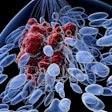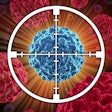
RNA analysis helped clarify the significance of genetic variants associated with hereditary cancers that were inconclusive based on DNA testing alone in a retrospective study from Ambry Genetics published online October 23 in JAMA Network Open.
Earlier this month, the company announced the launch of its +RNAinsight paired testing for RNA and DNA for genes associated with hereditary cancers. The idea is that testing for both provides more information for determining cancer risk.
Bolstering the case for paired testing, Dr. Rachid Karam, PhD, director of the translational genomics lab at Ambry, and colleagues published results from a retrospective study of RNA sequencing to assess inconclusive variants from DNA testing. The inconclusive variants were associated with hereditary breast and ovarian cancer (BRCA), Lynch syndrome, and hereditary diffuse gastric cancer.
Based on the study of blood samples, the researchers concluded that RNA genetic testing clarified results in 49 of 56 (88%) inconclusive cases. Of the 49 that were clarified, reclassification had actionable findings for 26, while 23 were deemed to be benign.
Inconclusive findings are common with DNA tests, the company noted. Out of 307,812 patients tested and evaluated by Ambry, 7,265 had variants that were deemed to be likely pathogenic or variants of uncertain significance. Ambry estimates that 1 in 43 people undergoing testing could benefit from the addition of RNA analysis.
"It will be important to evaluate the use of concurrent [DNA genetic testing] and [RNA genetic testing] in a prospective cohort to assess the ability of RNA analysis to decrease [variants of unknown significance] rates and increase the identification of clinically actionable variants in an unbiased fashion," Karam and colleagues wrote.

















